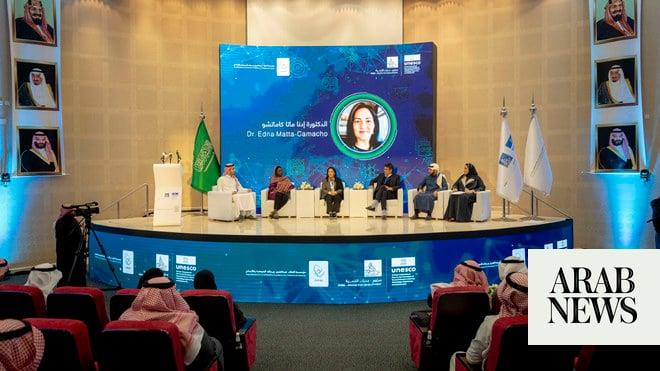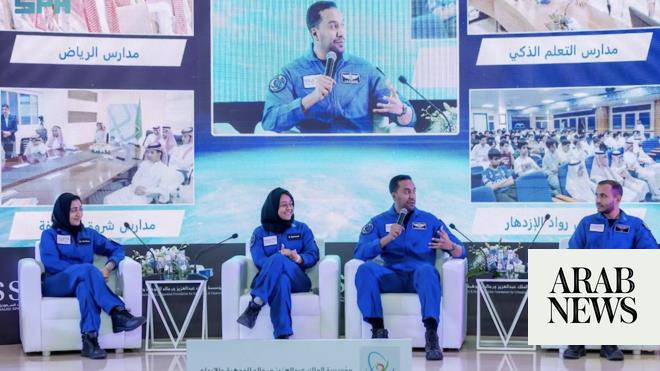
RIYADH: Eminent scientists from around the world met Saudi scientists of the future on Wednesday and shared with the students details of their journeys and experiences within the science, technology, engineering and mathematics fields, as part of Mawhiba’s “Eyes on the Future” initiative.
The experts included Swiss astronomer and Nobel Prize winner Didier Queloz, Colombian structural biologist Edna Matta-Camacho, and Fadji Zaouna Maina from Nigeria, an earth scientist at the NASA Goddard Space Flight Center. They are the members of the jury that will select the recipients of the inaugural UNESCO Al-Fozan International Prize for the Promotion of Young Scientists, along with Adah Almutairi, a Saudi-American professor at the University of California who was unable to attend the event.
“At Mawhiba we continuously aspire to enable talent and innovation, as they are the pillars to flourishing young minds,” said Nazeeh Alothmany, the organization’s deputy secretary general of corporate relations and business development, in his opening remarks.
“Through these initiatives, we work with our partners in all local and international sectors to provide an environment that promotes a passion for science and knowledge to the Kingdom’s youth.
“Our meeting today is a golden opportunity to platform global and international experiences from scientists, some of whom have received Nobel prizes and other internationally recognized awards, including the renowned Saudi scientist Adah Almutairi.”
As the STEM fields continue to evolve in an ever-changing world, Saudi authorities say they are investing billions in technology as a key element in the transformation of the country under the Kingdom’s Vision 2030 blueprint for development and diversification. Events such as the one on Wednesday are therefore seen as an important part of this as they encourage the international exchange of knowledge and experiences.
The event was moderated by leading and emerging Saudi scientists, including: Abdulrahman Alfozan, a former senior systems engineer at Facebook and founding engineer of delivery service Nash; Moath Abu Aisha, a researcher and expert in the use of 3D printing in healthcare; and Fatimah Al-Ali, a petroleum engineer at Saudi Aramco with experience in data analytics, reservoir engineering and operations management.
Ghanima Abuhaimed, a doctoral student and researcher, said in a speech on behalf of the Saudi scientists of the future at the event: “The future is full of uncertainty … But being here today in a room full of leaders, future-shapers, minds who are constantly asking questions, I am hopeful.
“We can do it because we are not only aware of the complexities of the problems around us but we are lucky to have the opportunities to come up with creative and practical solutions to these problems.”
During the day’s sessions, the expert guests and industry leaders discussed common challenges they face, ways to overcome them, how to maintain a balanced approach, and their thoughts on the future.
One discussion focused on ethnic disparities and disadvantages based on race within STEM sectors, along with the problems that can arise as a result of language barriers as the field becomes more global in nature.
Matta-Camacho and Maina talked about some of the difficulties they have faced as women of color in science, navigating industries traditionally dominated by white males.
“A challenge is that you might not look like other people but that’s who you are,” said Maina. “That’s your power today … Scientists are curious; we want to understand the universe and the world today, and you have your own structure and background, so just bring that to the table.”
Matta-Camacho, who is from Colombian but moved to Canada to pursue the greater opportunities available to her there, is the co-founder of Immigrant and International Women in Science, an organization dedicated to building a community of women working in science fields in Canada, in which they can share their experiences and help each other overcome language barriers, navigate the system, find work opportunities, and much more.
“When I was growing up (in Colombia), we didn’t have so much recognition regarding what career to study … I think it’s really important to focus on education from an early age and I think that what you’re doing here is fantastic, to nurture people’s education and potential in different STEM fields,” said Matta-Camacho.
The work of a scientist never ends, Queloz said. Even after winning his Nobel Prize for Physics in 2019, he said he felt no great sense of accomplishment but rather an aching need to continue to discover.
“I feel like I’m not completely done,” he said. “I know I have the greatest award you can imagine but I still feel like a student.
“Science is our emotional connection to the world. This is what pushes us to do what we do and it’s not the easiest path in life trying to find out the mystery of the world … but if you have a little bit of success in what you’re trying to explore, it gives you some joy.”
Mawhiba, more formally known as the King Abdulaziz and his Companions Foundation for Giftedness and Creativity, is a non-profit endowment organization that aims to identify and nurture talented and gifted students in scientific fields in the Kingdom.












